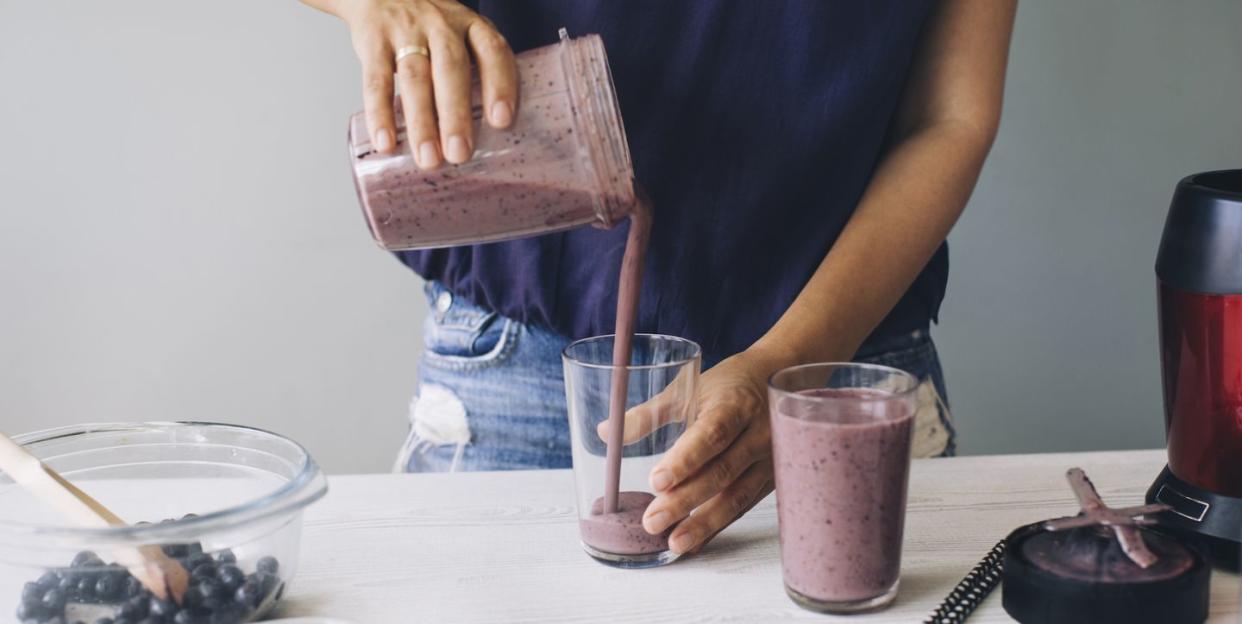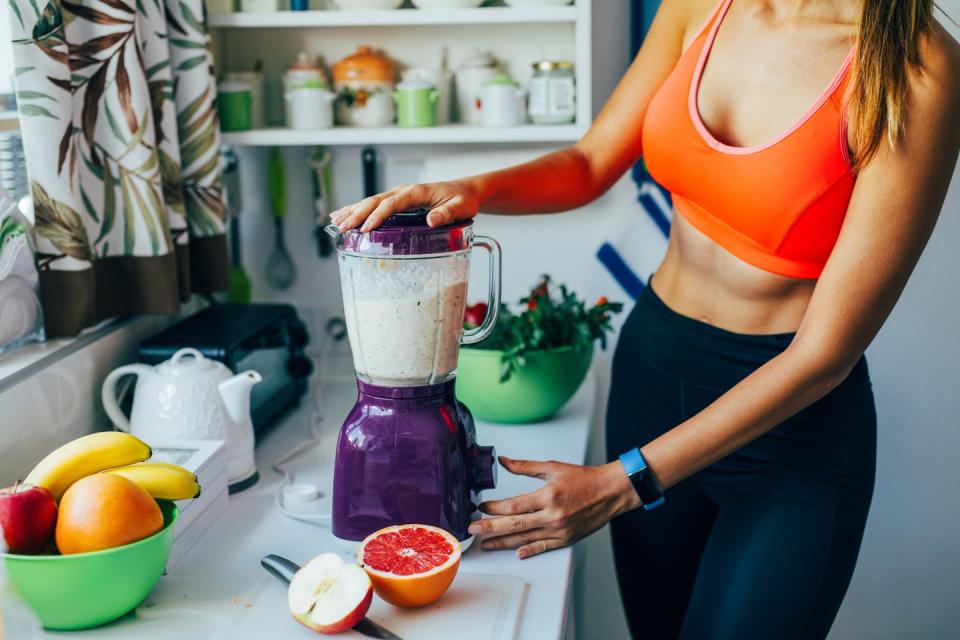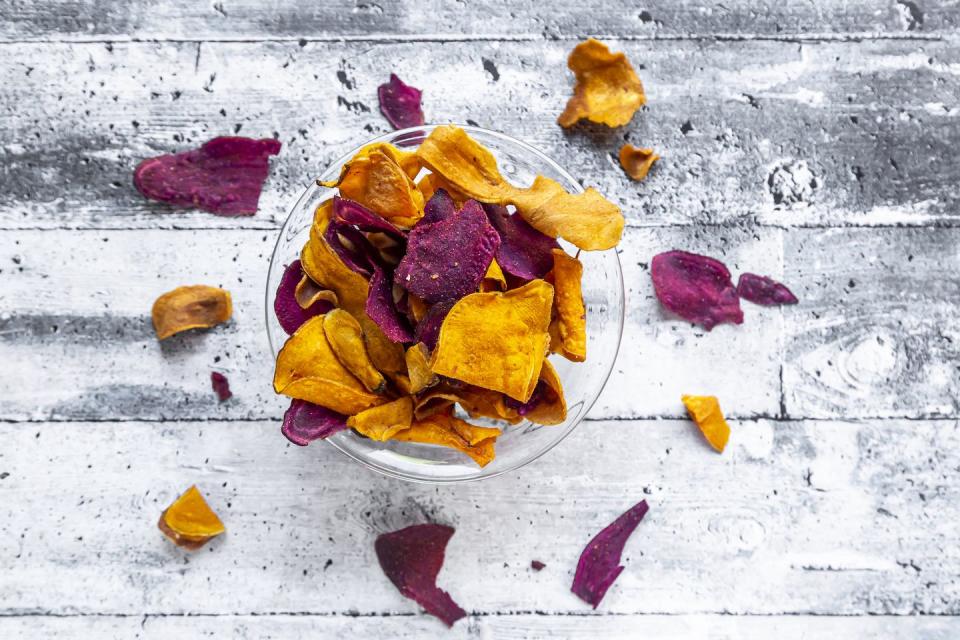8 Foods You Should Avoid After A Workout, According To An Expert

One of the key pieces of advice you'll get from personal trainers and nutritionists alike is to refuel after a workout. You deplete your body of energy with exercise and your muscles take a hit, so it's important to repair and replenish with food within the hour.
'When we exercise, we use up the energy stored in our muscles (called glycogen) and its important to replenish this source by having some carbohydrates post-workout to ensure our muscles can work properly,' NHS doctor Dr Frankie Jackson-Spence tells us.
'When we exercise, particularly if using weights or doing strenuous exercise, we cause tiny microtears in our muscles. It’s advisable to consume some protein after a workout so that the muscles have enough protein for growth and repair. Your post workout meal should be focused around carbohydrates and protein and lower in fats, because fats actually slow the digestion of carbs and protein, and we want these to get into our muscles quickly.'

But there's no point eating or drinking any old thing following a workout; some foods can do more harm than good.
We asked Integrative Nutrition Health Coach Amy Wright to help us navigate the good from the bad.
Here is a list of the types of food she recommends avoiding after exercise:
1. Sugary post-workout shakes
'A protein smoothie is one of my favourite post-workout meals because it can quickly nourish the body after an intense workout or weights session,' explains Wright. 'However, not all protein powders are created equal. Watch out for sugar-laden protein powders or worse, artificially sweetened shakes which may also include fillers, chemicals and bulking agents.

'My favourite vegan-friendly protein powders is Form Nutrition. After a workout, I usually mix two scoops up with a banana, 150g strawberries, whole oats, unsweetened almond milk, ice blocks and some super greens powder.'
2. Processed energy bars
'While some energy bars can be a convenient option for those busy days, avoid ultra-processed energy bars with lengthy ingredients lists,' she advises. 'A good rule of thumb is that if you don’t recognise an ingredient, your body won’t either.'
In particular, the health coach suggests avoiding snack bars that contain artificial sweeteners (such as aspartame), refined sugar, or high levels of natural sugar. 'An equally convenient, but ideal alternative could be a banana or berries with a handful of nuts,' she says.
3. Low-carb meals
While protein is widely recognised as a post-workout essential, did you also know that carbohydrates are a vital part of post-workout recovery and nourishment? The reason being, Wright explains: 'Your body taps into its glycogen stores during exercise and eating carbohydrates in your post-workout meal helps to restore them.'
You might not realise that fruits are an incredibly good source of carbohydrate, and Amy suggests strawberries, bananas, blueberries and kiwi are among some of her favourites for a post-workout refuel.

She also recommends opting for 'smart carbohydrates' such as whole grains, legumes, fruits and vegetables, rather than refined carbohydrates such as white bread, pasta or flour products. 'This will ensure you have sustained energy throughout your day,' the nutritional expert advises.
4. Sports drinks
You might think you look the part, clutching an isotonic drink while power walking in your leggings, but Amy doesn't necessarily advise sports drinks for after an everyday workout.
'Unless you are a professional athlete running marathons, I’d recommend avoiding sports drinks as they are often extremely high in sugar, sweeteners or chemicals,' she says.
'Although they are marketed as the perfect hydration and electrolyte replenishment, drinks such as filtered water, raw coconut water or a healthy protein smoothie are superior options that don’t contain the syrupy ingredients that spike blood sugar and zap energy.'
5. Salty, processed foods
'Craving salty food after exercise is common, as we often lose water and potassium through sweating,' Amy says.
But instead of reaching for the crisps, 'opting for a snack such as a banana is a great option for replenishing potassium levels'.

6. Fried foods
This is more of an obvious one, but the health coach recommends avoiding deep-fried fast foods because 'they contain little health benefit and can often contain harmful trans-fats.
'I am especially mindful to avoid these foods after a workout, as the high-fat content can slow the digestion process and leave me feeling sluggish rather than enjoying my post-workout high,' she notes. 'It's important to remember that exercise is a stressor, so we should aim to eat a post-workout meal that includes micro-nutrients and nourishing ingredients that fuel and take care of our body.'
Instead of opting for fried foods, choose a baked or steamed protein such as fish or chicken, along with a complex carb such as boiled rice, baked sweet potato or grilled vegetables. This kind of meal, Wright says, 'is a great way to refuel your body and provide you with long-lasting energy and strength'.
7. Caffeine
'Caffeinated beverages such as coffee can be a beneficial energy boost prior to a workout and may even enhance performance. While I don’t believe caffeine is harmful, I personally avoid coffee immediately after a workout,' says the nutritional expert. 'I find caffeine can dehydrate my body, so I stick to water in order to rehydrate after exercise.

'Caffeine also raises our body’s stress hormone cortisol. Exercise is essential to health, but it is also a stressor on the body causing cortisol release. While vital for healthy bodily function, too much cortisol can increase inflammation, cardiovascular issues, immunity and hormonal imbalances. Therefore, I enjoy my energising coffee before exercise and avoid it afterwards,' Wright explains.
8. Eating nothing
You might not always feel particularly ravenous after exercising, but Amy urges you not to skip your post-workout meal.
'It’s so important to nourish your body after exercise and it’s the ideal time to eat. Your body needs replenishment after all the hard work it has done, so it’s really important not to skip your meal after you work out,' she says.
Like this article? Sign up to our newsletter to get more articles like this delivered straight to your inbox.
In need of more inspiration, thoughtful journalism and at-home beauty tips? Subscribe to ELLE's print magazine now and pay just £6 for 6 issues. SUBSCRIBE HERE
You Might Also Like


